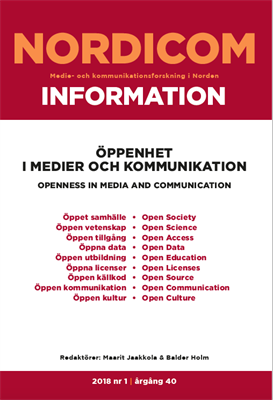Several challenges for openness in media and communication

Openness is a notion that is becoming increasingly topical. The question of open science is now frequently addressed in academics. Open educational resources have become more central in schools. People are sharing their vulnerabilities on social media using hashtags with references to openness. In response to this, Nordicom releases the Spring issue of the journal Nordicom Information, in which the theme is openness in media and communication.
What does openness actually mean, and is it possible to create a journal issue by opening up the entire production process? These are two of the questions that the editors of Nordicom Information wanted to study with the Spring issue. To allow people to follow the development of the topics in the issue, open lists of ideas were published in the form of an open online document. An Instagram account was also created, in which questions about openness were discussed and the production process could be followed.
“When we wanted to put openness into practice, we soon discovered a number of challenges. During the process, we came to understand how vulnerable the concept is and how easily it can be exploited,” says the editor Maarit Jaakkola.
Openness is often described as a value and attached to a product without allocating the resources required to the work, in the shape of, for example, transparency, access and responsiveness. As with ‘greenwashing’, in which an actor attempts to create a beneficial image of themselves by deploying positive associations, this may be called ‘open washing’.
“Because openness is a tool for creating trust, the extent to which the word has been put into practice is an important question to be aware of,” says Maarit Jaakkola.
Openness as a value and a tool
Open society, open culture, open science and open education have been established as buzzwords within different sectors of society to reflect on the open practices that build upon digitalisation and digital access to (open) data, the uses of open licenses and open sources. Openness thus not only requires tools to allow access and the dissemination of materials but also a culture with distinct values and attitudes that support openness.
The Nordicom Information openness issue includes the following topics:
- Open access publishing and open science
- Creative Commons and open licenses in education
- Journalistic uses of open data by national, regional and local authorities
- Fact-checking initiatives in civil society
- #Spoonie, #psynligt, #fuckcancer – campaigns related to #openness on social media.
Nordicom Information is published twice a year in English and Scandinavian languages, in both print and online (Open Access). Depending on the selected theme its ambition is to gain a mix of contributors from all the Nordic countries. Nordicom is a knowledge centre in the field of media and communications research at the University of Gothenburg.
The journal is available online and can be downloaded or ordered in print here.
The next issue of Nordicom Information will be published in December. It will be a jubilee issue and the theme will be announced in August.
For more information, please contact:
Maarit Jaakkola, Editor of Nordicom Information, telephone: +46 76 618 12 20, e-mail: maarit.jaakkola@nordicom.gu.se, Instagram: @nordicominformation
Mia Jonsson Lindell
Communications Officer
Phone: + 46 76 618 66 22
E-mail: mia.jonsson.lindell@gu.se
University of Gothenburg is one of the major universities in Europe, with about 37 800 students and a staff of 6 200. Its eight faculties offer training in the Creative Arts, Social Sciences, Natural Sciences, Humanities, Education, Information Technology, Business, Economics and Law, and Health Sciences. The University’s unique breadth in education and research provides an interdisciplinary environment conducive to collaboration with private enterprise and public institutions. The quality of the University has earned recognition in the form of numerous awards, including a Nobel Prize, and a steady stream of applicants at all levels.
Tags:


